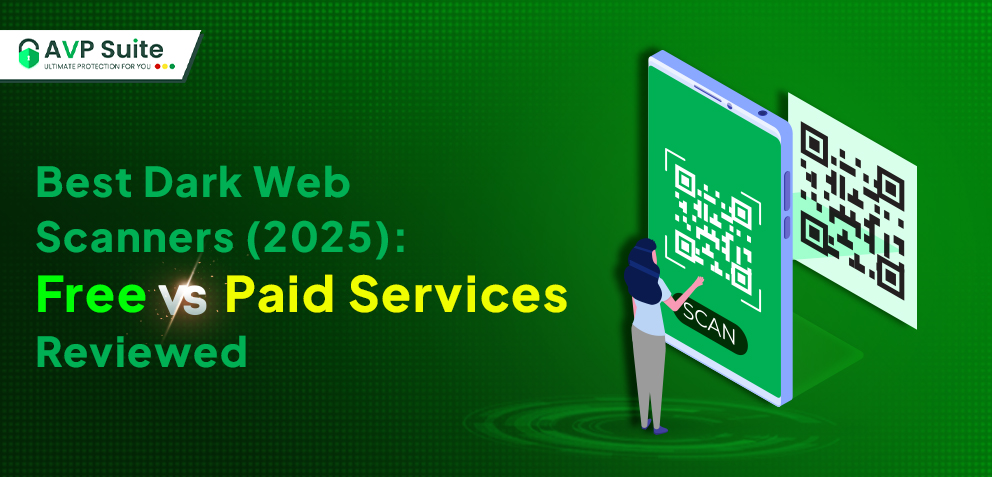Best Dark Web Scanners (2025): Free vs. Paid Services Reviewed


Now that you are aware of the dangers, how can you determine your exposure? In today’s digital world, dark web scanning and monitoring services have become indispensable resources for protecting people’s and companies’ online identities. Understanding how to monitor your personal information on the dark web is crucial, given the increasing frequency of data breaches that affect millions of users worldwide.
In this post, we will examine the strengths and weaknesses of dark web scanning services, whether you are considering free options or a premium plan. If you’re based in the US and trying to figure out which service fits your needs best, you’ll find a quick rundown of some top contenders that might just be right for you.
Free dark web scan tools are frequently entry-level programs made to provide you with a fast overview of whether your data has been compromised. These days, you can quickly run a check on your password or email to see if it’s shown up in any public breaches, even if it’s just a snapshot of things done.
Related Read: Behind the Scan: How Do Dark Web Monitoring Tools Find Your Data?
AVP Suite detects & blocks hidden threats before they strike
Try AVP Suite for Free!
Most free services lean on huge databases of compromised credentials. They perform one-off checks so you get a quick heads-up, but they don’t stick around keeping track of any later issues, which means you might be unaware of future risks.
This service is often seen as one of the better-paid options out there for dark web monitoring. It comes with things like credit tracking, safeguards against identity theft, and a support team that’s there when you need them. Many folks end up liking its flexibility since it offers various pricing levels to match different requirements.
Even the free version of this tool, which is part of a broader security package, monitors the dark web. It brings some extra perks like real-time alerts and a pretty sturdy reputation against malware. Usually, users expect reliable performance and reasonable prices.
For those who are worried about their online safety, paid dark web monitoring services offer a more complete solution. These services run nonstop; unlike free tools, we steadily provide continuous monitoring paired with a wider array of data points—credit card info, Social Security Numbers (SSNs), and a few extra details.
Paid services frequently offer proactive monitoring and real-time alerts, making sure you are aware of any possible threats as soon as they materialize. Here’s a comparison of dark web monitoring tools concerning the HaveIBeenPwned alternatives:
Related Read: Maximize Your Dark Web Scans: Best Practices and What They Can’t Find
LifeLock is a premium service that specializes in monitoring the dark web; if you value protecting your personal information, it’s a worthwhile consideration. Not only do they closely monitor your credit and identity, but they also have a support team available to assist you when needed. There are several pricing options available, so you can usually pick a plan that jives with what you require. Most of the time, it seems like they’ve made a concerted effort to meet all your needs, despite occasionally sounding a bit too polished.
This tool seamlessly integrates dark web monitoring into its broader security mix, incorporating real-time alerts that can positively surprise you and a robust malware defense track record. This service brings a nice extra edge by bundling these features together—you get more than just the basics. The pricing seems competitive too, and overall, it delivers a dependable performance, even if some details are repeated throughout the experience.
The AVP Suite Dark Web Monitoring Review and Web Suite Dark Web Scanner also offer a paid version that enhances the free tool’s capabilities. It continuously monitors and triggers timely alarms, seamlessly integrating with other safety features. Honestly, if you care about keeping your info safe, this mix of constant checks and smart hookups with additional security tools tends to deliver just what you need, even if it isn’t flawless all the time.
Take into account the following crucial characteristics when contrasting dark web monitoring costs and its tools:
Types of Information Monitored: Seek services that verify a range of information, including credit card numbers, emails, and SSNs.
Regularity of Monitoring/Scans: Because it provides greater protection against data breaches, continuous monitoring is better than periodic checks.
Warning System: To make sure you can respond to possible threats promptly, assess the alerts’ clarity and speed.
Bundled Services: Take into account if the service comes with extra features like antivirus protection, VPN protection, and ID theft recovery.
Cost and Value Proposition: Determine if the features provided outweigh the cost.
Choosing the best dark web scanner requires determining your spending limit and degree of risk. A free tool might be adequate if you are looking for simple checks and have little exposure. However, if you manage a business or frequently share sensitive information, investing in a paid service could bring you peace of mind. It’s critical to be proactive and knowledgeable about protecting your data.
Think about your degree of technological comfort and the significance of ongoing monitoring when making your choice. While some users value complete protection, others might prefer a simple free service.
When it comes to staying safe online, it’s all about finding a dark web scanner that fits what you need. In most cases, you have to juggle both features and price while dealing with more frequent data breaches these days. Sometimes, being proactive about safeguarding your details means examining options carefully and even revisiting the basics more than once.
If you’re interested in understanding the intricacies of these scanners, you may find our core content on dark web monitoring to be quite enlightening, despite the sometimes overwhelming technical details.
So, go ahead and explore your options—you owe it to your online persona to get some solid protection!